
World Oil Day is celebrated on September 29 and highlights the importance of this natural resource for global economic activity. Oil is one of the planet’s
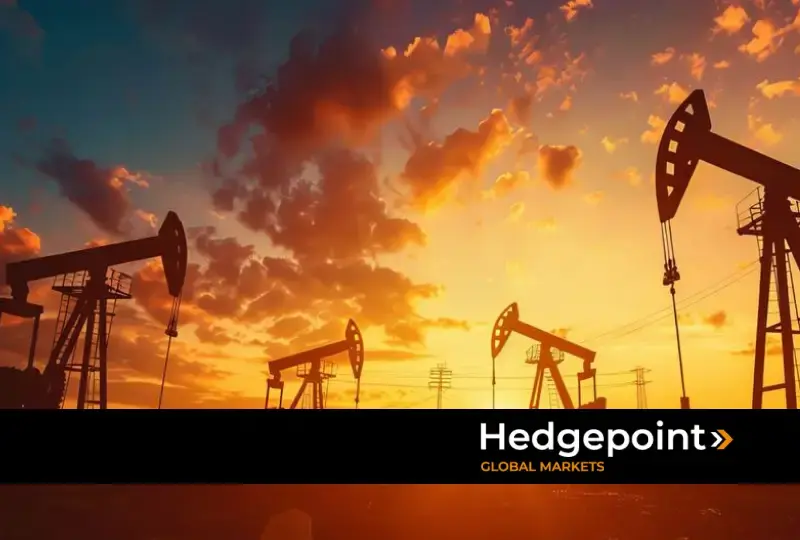
World Oil Day is celebrated on September 29 and highlights the importance of this natural resource for global economic activity. Oil is one of the planet’s main sources of energy and generates the most consumed fuels in the world. It is the basis for the production of gasoline, diesel oil, kerosene and more. These products are heavily used due to their high efficiency in cars, trucks, buses and aircraft.
In this article, we’ll look at the current oil production scenario, the outlook for the future of the sector, the challenges of the energy transition and more. Read on!
World oil production plays a central role in global energy supply. In 2022, Crude Oil was the best-selling product on the planet in monetary terms, reaching the $1.45 trillion mark. In the same year, this sector accounted for 6.13% of world trade.
In addition, global crude oil production grew by 1% in 2023. This was due to the increase in production in non-OPEC (Organization of Petroleum Exporting Countries) countries, such as the United States (+8.5% in 2023), Brazil (+12%) and Guyana. This growth has been constant since the 90s:
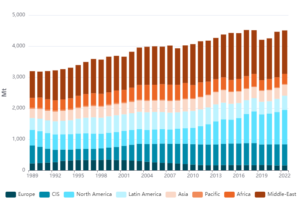
Source: Enerdata
Countries like the United States, Saudi Arabia, and Russia are the largest global producers, accounting for almost half of the world’s production. According to International Energy Statistics, the US produces more crude oil than any nation at any time.
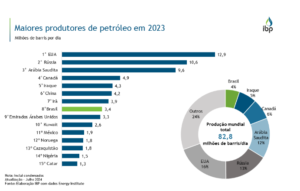
Source: IBP
Including condensate oil, the United States reached an average of 12.9 million barrels produced per day in 2023. The previous record was 12.3 million, set in 2019 by the same country. Despite such high figures, the nation still imports oil as it is the largest consumer of this product in the world.
Last year, the United States consumed almost 19 million barrels of oil a day. The nation ranks third as the world’s largest importer. In 2023, China came first with more than 13.7 million barrels imported per day. Europe followed closely behind as the second largest importer, with 12.8 million barrels per day.
In terms of exports, Saudi Arabia led the way with US$ 310.6 billion exported in 2023. This figure corresponded to 16.3% of global exports that year. Russia, Canada, and the United States complete the world ranking of the largest exporters, respectively.
Read also:
The outlook for the future of oil is directly related to the evolution of global demand and energy transition initiatives. According to the International Energy Agency (IEA), oil demand should continue to grow in the short term, with a peak expected in 2029.
OPEC reports the same growth, with a world demand of 108.3 million barrels (mb/d) of oil per day by 2030. After that, the market remains stable at 109.8 mb/d in 2045. See the graph below:
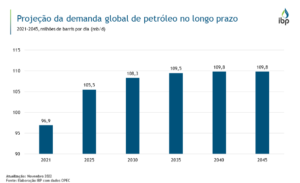
Source: IBP
In the energy transition, the role of oil is linked to the diversification of energies, since today’s reserves already proven by the producing countries should still last at least another 50 years. These figures can be found in OPEC’s Annual Statistical Bulletin 2024:
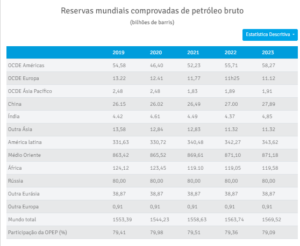
Source: OPEP
According to the organization, OPEC’s share of oil reserves will be 79.09% by 2023. The institution plays a key role in this market due to its large share of production. You can follow the breakdown between the participating countries in the graph below:
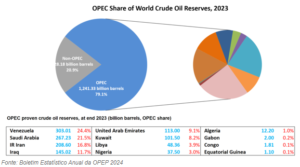
Source: OPEP
Created in 1960, the group has 12 countries to coordinate oil production and prices globally. Among the countries that are part of the organization are Saudi Arabia, Qatar, the United Arab Emirates and more.
As for oil prices, the U.S. Energy Information Administration (EIA) reports that values have mainly traded within a narrow range in 2024. The spot price of Brent crude oil, for example, averaged 82 dollars per barrel in August, marking the eighth consecutive month in which it has averaged between 80 and 90 dollars per barrel.
Below you’ll find data on prices in recent months and the short-term projections provided by the EIA:
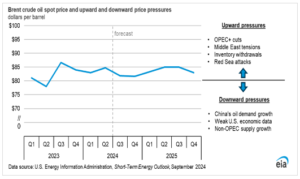
Read also:
Crude oil is one of the world’s most important sources of energy because it has been the basis for economic and technological advances in recent decades. Today, the product continues to move the market both in physical trading and in derivatives, as well as being crucial in supplying vehicles, machinery and others.
More than just fuel, crude oil is also a raw material for plastics, cosmetics, fertilizers and paints. Its relevance is highly connected to the economy of importing and exporting countries, generating jobs and quality of life.
In Colombia, for example, the product is essential for the country, as it accounts for 31.3% of its exports. In the United States, the oil and gas industry was responsible for 12.3 million jobs in 2020.
Read also:
World Oil Day reminds us of its enormous relevance to the global economy, both now and in the future. The natural resource will continue to play a crucial role in the world’s energy matrix.
Hedgepoint, with its market intelligence and trained experts, understands the role it plays in helping organizations navigate the challenges and opportunities of this dynamic sector.
Access our exclusive energy updates and keep abreast of global dynamics and trends.

Rua Funchal, 418, 18º andar - Vila Olímpia São Paulo, SP, Brasil
Contato
(00) 99999-8888 example@mail.com
Section
Home
O que Fazemos
Mercado
Quem Somos
HUB
Blog
Esta página foi preparada pela Hedgepoint Schweiz AG e suas afiliadas (“Hedgepoint”) exclusivamente para fins informativos e instrutivos, sem o objetivo de estabelecer obrigações ou compromissos com terceiros, nem de promover uma oferta ou solicitação de oferta de venda ou compra de quaisquer valores mobiliários, commodity interests ou produtos de investimento.
A Hedgepoint e suas associadas renunciam expressamente a qualquer uso das informações contidas neste documento que direta ou indiretamente resulte em danos ou prejuízos de qualquer natureza. As informações são obtidas de fontes que acreditamos serem confiáveis, mas não garantimos a atualidade ou precisão dessas informações.
O trading de commodity interests, como futuros, opções e swaps, envolve um risco substancial de perda e pode não ser adequado para todos os investidores. Você deve considerar cuidadosamente se esse tipo de negociação é adequado para você, levando em conta sua situação financeira. O desempenho passado não é necessariamente indicativo de resultados futuros. Os clientes devem confiar em seu próprio julgamento independente e/ou consultores antes de realizar qualquer transação.
A Hedgepoint não fornece consultoria jurídica, tributária ou contábil, sendo de sua responsabilidade buscar essas orientações separadamente.
A Hedgepoint Schweiz AG está organizada, constituída e existente sob as leis da Suíça, é afiliada à ARIF, a Associação Romande des Intermédiaires Financiers, que é uma Organização de Autorregulação autorizada pela FINMA. A Hedgepoint Commodities LLC está organizada, constituída e existente sob as leis dos Estados Unidos, sendo autorizada e regulada pela Commodity Futures Trading Commission (CFTC) e é membro da National Futures Association (NFA), atuando como Introducing Broker e Commodity Trading Advisor. A Hedgepoint Global Markets Limited é regulada pela Dubai Financial Services Authority. O conteúdo é direcionado a Clientes Profissionais e não a Clientes de Varejo. A Hedgepoint Global Markets PTE. Ltd está organizada, constituída e existente sob as leis de Singapura, isenta de obter uma licença de serviços financeiros conforme o Segundo Anexo do Securities and Futures (Licensing and Conduct of Business) Act, pela Monetary Authority of Singapore (MAS). A Hedgepoint Global Markets DTVM Ltda. é autorizada e regulada no Brasil pelo Banco Central do Brasil (BCB) e pela Comissão de Valores Mobiliários (CVM). A Hedgepoint Serviços Ltda. está organizada, constituída e existente sob as leis do Brasil. A Hedgepoint Global Markets S.A. está organizada, constituída e existente sob as leis do Uruguai.
Em caso de dúvidas não resolvidas no primeiro contato com o atendimento ao cliente (client.services@hedgepointglobal.com), entre em contato com o canal de ouvidoria interna (ombudsman@hedgepointglobal.com – global ou ouvidoria@hedgepointglobal.com – apenas Brasil) ou ligue para 0800-8788408 (apenas Brasil).
Integridade, ética e transparência são valores que guiam nossa cultura. Para fortalecer ainda mais nossas práticas, a Hedgepoint possui um canal de denúncias para colaboradores e terceiros via e-mail ethicline@hedgepointglobal.com ou pelo formulário Ethic Line – Hedgepoint Global Markets.
Nota de segurança: Todos os contatos com clientes e parceiros são realizados exclusivamente por meio do nosso domínio @hedgepointglobal.com. Não aceite informações, boletos, extratos ou solicitações de outros domínios e preste atenção especial a variações em letras ou grafias, pois podem indicar uma situação fraudulenta.
“Hedgepoint” e o logotipo “Hedgepoint” são marcas de uso exclusivo da Hedgepoint e/ou de suas afiliadas. O uso ou reprodução é proibido, a menos que expressamente autorizado pela HedgePoint.
Além disso, o uso de outras marcas neste documento foi autorizado apenas para fins de identificação. Isso, portanto, não implica quaisquer direitos da HedgePoint sobre essas marcas ou implica endosso, associação ou aprovação pelos proprietários dessas marcas com a Hedgepoint ou suas afiliadas.
aA Hedgepoint Global Markets é correspondente cambial do Ebury Banco de Câmbio, de acordo com a resolução CMN Nº 4.935, DE 29 DE JULHO DE 2021, Artigo 14 do Banco Central do Brasil (BACEN).
Para mais informações sobre nosso parceiro, serviços disponíveis, atendimento e ouvidoria, acesse o link a seguir: https://br.ebury.com/